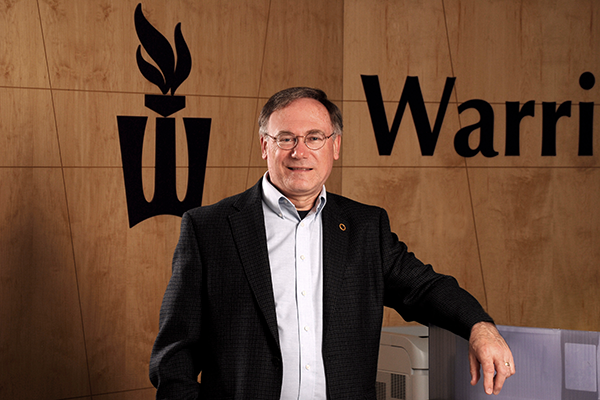By Sarah Certa ’11
When Greg Peterson first joined Winona State’s Financial Aid Services as assistant director in 1987, time cards were still done on paper, federal loans came from private loan banks, aid could only be dispersed once a week, and student records were kept on PC software.
Now, as Peterson finishes his final year as WSU’s director of financial aid, he recalls how much the department has grown over the past 26 years, along with the challenges of adapting to students’ needs as the economy changes and new technology emerges.
Peterson received his master’s in educational administration from the University of Wisconsin-La Crosse. Throughout his career at Winona State he’s been instrumental in implementing many changes in Financial Aid Services, including the integration of the student record system with the U.S. Department of Education in 1997, which allows students to more quickly access and complete their student loan applications. This enables applications to be processed much more quickly, and as a result WSU has been able to disperse financial aid on a daily basis.
Financial Aid Services has also been keen on keeping up with technological advances, setting up online scholarship applications and direct deposit, as well as transitioning to electronic time cards, which allows student workers to get on the payroll much faster.
“Many of these changes are invisible to the public eye,” says Peterson. “But that’s also how we know they are effective. When something isn’t working, that’s when people will notice.”
Although technology and integration have yielded a fast and highly effective financial aid system for Winona State students, there have also been many challenges, especially in recent years. “Prior to the recession, students who had good credit could apply for private loans on their own behalf,” says Peterson. “But new laws have pretty much eliminated that.” In addition, students who took a summer term used to be able to apply for an additional Pell Grant, but that, too, is no longer in place.
Peterson says the Financial Aid Services is dedicated to addressing these issues, and one of the first steps was changing the financial aid advising process. “We’re helping students find additional financial aid options as well as really encouraging them to finish their degrees on time,” says Peterson.
He says he hopes to see the Pell Grant program, which provides aid to low income undergraduate students, continue to grow as well as a stronger commitment to more need-based scholarships.
Despite the challenges, Peterson feels confident in the department’s ability to keep up and continue aiding students in earning their education. “We have a pretty dedicated group of people on the second floor of Maxwell,” he says. “It’s been an honor.”


